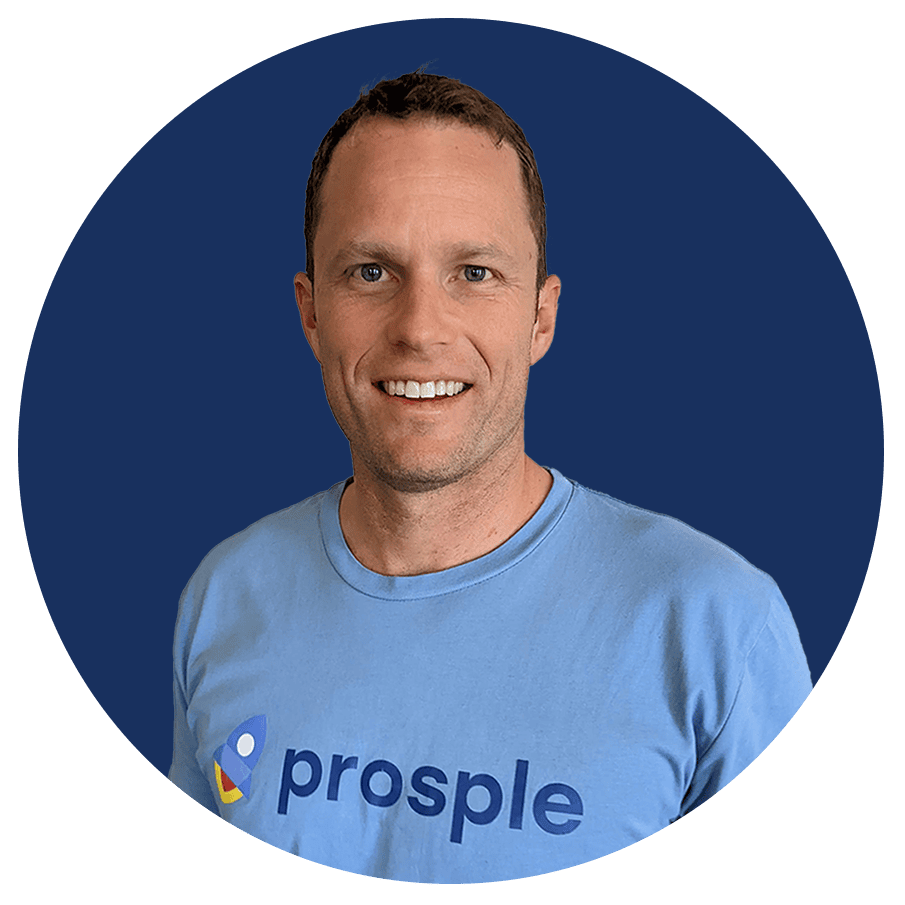
Jeffrey Duncan
Prosple Co-founder
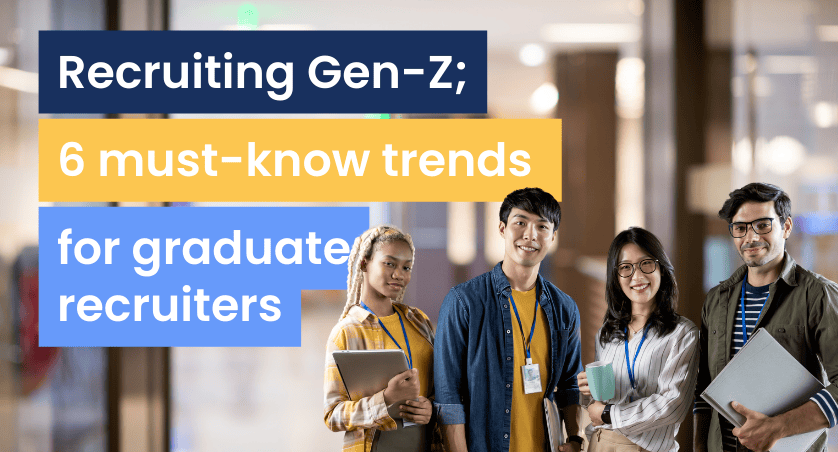
Just when you thought you had recruiting millennials down to a science, all the fresh grads… stopped being millennials.
The wheels of time have turned again. And that means you need to throw out everything you thought you knew about graduate recruiting and start learning a whole new playbook so you can effectively market to Gen Z.
Okay, maybe that’s a tad dramatic. People never really stop being people. But students today do have a different perspective from any generation that has come before them — for one simple reason above all else.
Today’s fresh grads are the first true digital natives. Even the most tech-obsessed millennial probably still remembers a time before the internet was everywhere, but for members of Gen Z (at least in developed countries), memories like that simply don’t exist.
That lifelong familiarity with an always-online existence has coloured how they approach digital content — including marketing (and if you’re in the graduate recruiting business, you’re kidding yourself if you don’t think that you’re actually in marketing).
In order to attract the top graduate talent, you need to meet Gen Z students where they are. Here are six essential ideas on how to do that.
1. The platforms, they are a-changin
1. The platforms, they are a-changin
Now, you already know that different age groups tend to prefer different social media platforms. Unfortunately, this means that when you’re marketing to Gen Z, strategies that worked even a few years ago when you were recruiting millennial grads won’t deliver the same results.
For example, Facebook is the most popular global social media platform by a significant margin, with almost 3 billion users. And most Gen Zers do still have Facebook accounts. However, as a whole, Gen Z is significantly less active on Facebook than are users from older generations.
Meanwhile, new social media platforms are snapping up this market share. TikTok, in particular, continues to rocket upwards and has become a platform of choice for a majority of Gen Z users within the last two years. A report by Insider Intelligence predicts that Instagram, Snapchat, and TikTok will each have roughly 20-25 per cent more Gen Z users than Facebook at least through 2025.
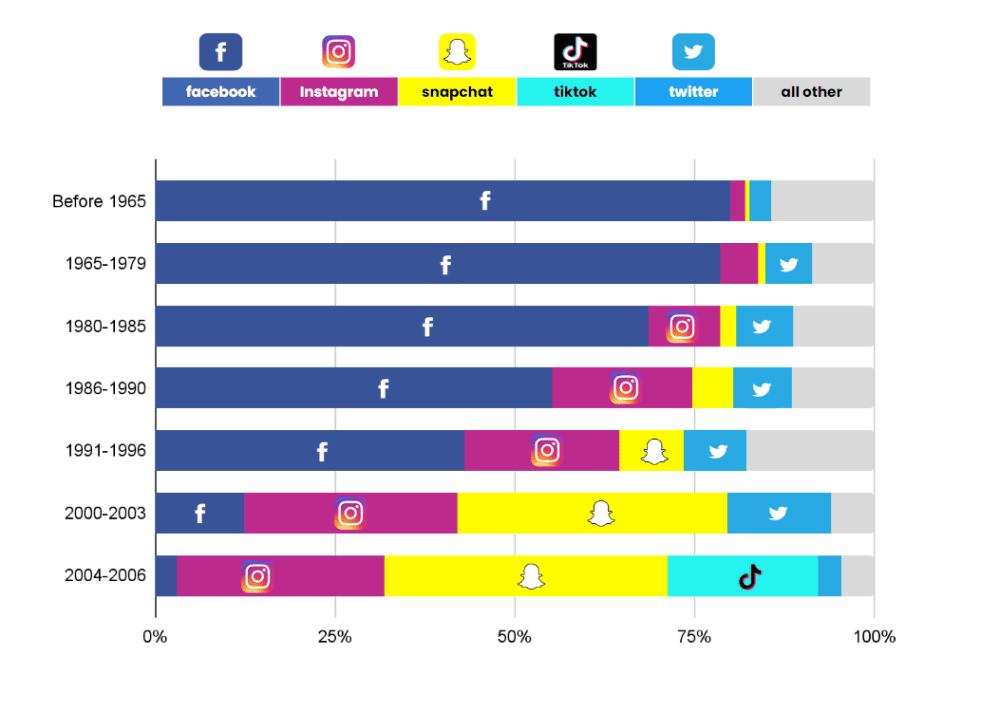
Favourite social platform by year of birth. Source: Prosple / Collage Group / Statista
This data reminds us that unlike circa 2010, when Facebook served as the town square for the entire internet, there is no longer any one platform to rule them all. The market is fragmented — and that seems unlikely to change anytime soon.
One reason why? “Gen Z really believes that different platforms are for different types of content”, says Sarah Weise, author of InstaBrain: The New Rules of Marketing to Generation Z. Instead of basing their entire digital experience around one app, Gen Z grads may use Instagram to present a curated online image, Snapchat to keep up with their close friends, and TikTok or YouTube for news and entertainment.
But you can expect that even those platforms of choice will keep changing. At the time of this writing, BeReal is growing exponentially, shooting to number one on many app stores. Who knows what the social media landscape may look like in even six months?
Gen Z also uses the same platforms differently than older users. While people of all ages are on TikTok, many Gen Zers think of the app as a search engine, preferring to look there instead of Google for answers to questions.
You’ll also notice that many recruiters’ favourite platform, LinkedIn, doesn’t even make an appearance on either one of these lists. Per Weise, “[Gen Zers] all have accounts. They're required by schools to create accounts, especially in colleges, but they hate it. It feels intimidating to them.”
Key recruiting takeaway
Key recruiting takeaway
If you want to recruit top Gen Z talent, flexibility is key. You’ll need to shift your efforts away from legacy platforms like Facebook or LinkedIn and towards the apps of the moment.
Follow the students, because they certainly won’t be following you.
Now, this doesn’t mean that you should just start posting haphazardly on every popular platform all at once. You’ll want to take time to understand how to succeed on each one individually.
Every platform has its own nuances — what works on Instagram may fall flat on TikTok. You’ll do better mastering one specific app at a time than going too fast and failing to appeal to your audience on several.
(For more insight here, speak to your Prosple consultant about how we can help you create appealing content for Gen Z-approved platforms.)
2. Video, video, and more video
2. Video, video, and more video
Gen Z loves video. Period.
As we’ve already explored above, the favourite social platforms for up to 60 per cent of Gen Zers are built around short-form video content (TikTok and Snapchat). This number blows out to nearly 90 per cent if we include Instagram (which increasingly resembles another video platform, as Meta makes moves to retain market share from TikTok).
The trend is clear — short-form video content is big, growing fast, and unlikely to go away anytime soon. As Sarah Weise puts it, ”[Gen Zers] don't like reading the articles.”
Of course, the primacy of video content is hardly news to anyone working in marketing. Going back at least as far as the mid-2010s infamous “pivot to video”, getting attention online has been all about generating compelling videos.
But the type of video content has evolved over the last few years. Even more than millennials, Gen Z cares mostly about one thing — UGC or user-generated content.
Instead of slickly produced, high-quality videos shot with expensive equipment, Gen Z wants content that feels like it was created by an ordinary person — one of their own. Traditional aspect ratios are out and vertical video, shot on mobile, is in.
Look around and you’ll see this everywhere in consumer marketing. The most successful brands partner with dozens or even hundreds of influencers, each of whom creates original mobile content that shows them using that brand’s products.
Done right, this approach creates the feeling that you — the audience — are discovering this brand alongside your peer — the influencer — instead of simply being a passive recipient of another corporate marketing campaign.
(Meanwhile, higher production values will often make Gen Z viewers less likely to trust a piece of content because it will come across as too manufactured.)
Another thing to consider is that each piece of content also has less time than ever to grab a viewer’s attention. If you’re creating a video, it needs to be short — really short.
“One thing we see is that [Gen Z viewers] have significantly shorter attention spans. I believe that is from being bombarded by visual inputs scrolling across the screen from the time that they were very young”, observes Weise. “Their attention span has decreased. Millennials have about a 12-second attention span and Gen Z has about an 8-second attention span”.
Finally, if your video has audio, don’t expect anyone to listen to it. The vast majority of videos (an estimated 85% on Facebook) are watched without sound — which is why so many have text captions plastered all over them.
Key recruiting takeaway
Key recruiting takeaway
Don’t try to reinvent the wheel. Follow the example of consumer brands and embrace short-form, user-generated video content.
Now, the easiest way to do this is to bring your own graduate hires into the process. If you’ve got a sizable number of fresh grads working for your organisation, find out who among them already enjoys creating social media content and ask them to take the lead in making UGC to promote your employer brand.
By doing this, you’ll avoid the inevitable awkwardness of an older generation trying to latch onto whatever the kids are doing. Instead, you’ll have Gen Z marketing directly to Gen Z, which is a recipe for exactly the kind of peer-to-peer marketing that leads to strong results.
(Talk to Prosple about how you can make this happen. We’ll give your graduate content creators the support to fully harness their talent, including briefs and editing assistance.)
3. Even search has gone social
3. Even search has gone social
Now, we’ve touched on this already, but it’s worth exploring further. Not only does Gen Z largely prefer videos to articles, they increasingly prefer video platforms to traditional search engines.
“If I could boil it down to one key difference between millennials and Gen Z, it would be the question they ask themselves when they go to find information,” says Sarah Weise. “Millennials will say, ‘What do I want to know?’ They'll think about it. They'll figure it out and then they'll Google it.”
Gen Zers, on the other hand, ask, “‘What should I know?’ Instead of just creatively thinking about what they want to know, they scroll… for hours and hours…waiting for inspiration to strike. They're relying on the algorithms in all of these platforms to tell them what they should be interested in.”
In other words, social media is beginning to supplant search engines as a tool for the discovery of knowledge and information. Executives at Google have recently acknowledged as much, citing a drop in search traffic due to Instagram and TikTok eating into Google’s search market share.
Why? Many Gen Z users feel that TikTok, for example, shows them relevant content faster than Google. The platform’s algorithm presents each individual with their own, unique feed that is perfectly tailored to their specific interests.
Does this different way of discovering information have implications for the way Gen Z makes decisions? You bet it does. “Because there's this constant waterfall of content, they're making decisive snap judgments about what they're interested in,” notes Weise.
“[Gen Zers] have this superpower where once they decide what they're interested in, they can deep dive into the content and they can really block out all distractions and just focus on that one thing, like hyper-focus on that one thing for hours, even weeks, at a time.”
It’s easy to imagine how these different information search and decision-making tendencies carry across to Gen Z career decisions.
Consider a high-potential penultimate-year millennial student beginning their graduate career search. More than likely, they’ll put some thought into a shortlist of prospective graduate employers and proactively seek out information via the traditional channels that have long worked for graduate recruiters (online searches, careers fairs, etc).
This makes life easy for you, the recruiter — you know exactly when and where you need to be.
Now picture that same penultimate-year student from Gen Z. There’s no guarantee they’ll seek out your firm as an employer, no matter how strong your employer brand is. They’re more inclined to wait for career inspiration to come to them via their social feed.
One day they see a candid day-in-the-life video from a local startup on their TikTok feed. Boom — inspiration strikes! What follows is not careful research into startup versus traditional corporate career paths, but rather a snap decision to become an entrepreneur followed by a deep dive exclusively into startups.
Non-startup employers, who’ve assumed they’ll have an opportunity to engage this student at next year’s career fair, never even get a look in.
Key recruiting takeaway
Key recruiting takeaway
What does this all mean for recruiters? You’ve got to expand your efforts beyond the traditional two to three-month recruiting season. Graduate recruiting is now a year-round campaign.
You can no longer assume that a strong presence at career fairs or a compelling recruiting page on your website is going to be enough to get you over the finish line with top graduate talent. Today, that approach may not even get you in the game — because grads might not know you exist.
This doesn’t mean that you’ve got to go to career fairs 52 weeks a year. But it does mean that when Gen-Z talent comes looking at 11 PM on a Tuesday in August, you don’t want to leave them hanging.
Instead, give them content to engage with year-round! This is not an audience that’s going to patiently wait for nine months until you get around to posting information about your grad program in March next year.
You also need to start reaching out to students earlier in their academic careers. Many Gen Zers are no longer waiting until their final year of university to start thinking about their graduate job choices. If you’re not actively marketing to younger students, then you may be speaking to a target audience who have already made up their minds.
Remember, here, your recent graduate hires are your best resource. Use them! Get their genuine grad stories out there so you’ve got a shot at being at the right place at the right time to strike inspiration for that hard-to-engage Gen Z talent.
(Again, work with Prosple to ensure that your content is authentic, discoverable, and up-to-date.)
4. Trust is earned, not given
4. Trust is earned, not given
Previous generations entering the workforce did so with an innate sense of trust in corporations and institutions. But that’s not so with Gen Z. According to a 2020 study by Salesforce, only 42 per cent of Gen Z say they trust brands and businesses.
Research by McCrindle speaks to the drivers. Per their Future of Education 2020 report, global challenges like the pandemic have played a major role in shaping young adults’ outlook.
“Gen Z is growing up during a time of turmoil. They’re living in the shadow of the pandemic, when systems are breaking down. They aren’t sure who to trust, which means brands have to work even harder to earn Gen Z’s business.”
If Gen Z students are likely to be less trusting of companies, what does this mean for graduate recruitment campaigns?
In a word, you’ve got to be honest and authentic in your messaging. Gen Zers are internet natives. They know misinformation is common online, and have developed a formidable defence: finely tuned ‘bullshit detectors.’
To get past this, graduate recruiters need to ensure their marketing focuses on the realistic over the idealistic.
“Authenticity is a big deal to this generation as a whole,” says Sarah Weise. “They've been bombarded by information every day. It's more and more new stuff. And when they see something that feels real and authentic, they love it. It's a way for them to filter through information.”
With all this in mind, it’s no surprise to see Gen Z gravitate toward information sources such as their peers, personal network, and community (including online communities).
Anonymous forums like Whirlpool, are, for all their faults, authentic — full of real people and really honest feedback. Again, Gen Z is all about UGC and instinctively prefers to hear from people over corporations.
As long as official employer brand channels opt to bombard students with airbrushed, idealistic messages and corporate marketing buzzwords, graduate recruiters are going to continue to face an uphill battle to engage Gen Z on their terms.
Key recruiting takeaway
Key recruiting takeaway
More often than not, the authenticity organisations demonstrate in their recruitment marketing remains only skin deep.
This presents bold graduate recruiters with an enormous opportunity to break the mould and stand out from the crowd. Square with your Gen Z audience, and tell it as it is! The more honest you are, the more likely your marketing is to resonate — and the more likely you are to earn their trust (and a job application!).
(Speak to Prosple about how you can include user-generated content in your campaign and importantly, post transparent and authentic job ads.)
5. Not just another cog in the machine
5. Not just another cog in the machine
Let’s cut to the chase: Gen-Z just doesn’t put traditional corporate careers on a pedestal as previous generations did.
One reason why? They’re more used to fending for themselves.
“Generation Z, being in front of a screen the whole day… their parents didn't really do things for them”, says Sarah Weise. “So this created a generation of people who are more independent than, say, millennials”. Rather than default to a tried and tested path, they learned “how to do things for themselves using the internet.”
What does this mean for their career aspirations? Put simply, the appeal of a safe job at a big bank or prestigious professional services firm doesn’t hold the same sway that it did for prior generations.
As a result, a growing number of Gen Z are skipping over applying to graduate programs altogether. Others do apply, but with the view of using a few years working for a major firm as a stepping stone towards the career they envision for themselves long-term.
Which begs the question: If Gen Z no longer sees climbing the corporate ladder as the measure of career success, then what are they aiming for?
Well, Gen Z is the most entrepreneurial generation of our time. A whopping 86 per cent of Gen Zers expect to be entrepreneurs of some sort in the future, either as a side hustle or as their main job.
According to McCrindle’s Understanding Generation Z report, “They’re combining economic pragmatism... with digital savvy and intuitive technology skills to move to this entrepreneurial mindset.”
“We’ve got a generation looking for careers and roles that are around purpose, meaning, values resonance, community connection and making a difference or having an impact.”
Through this lens, is it any surprise that given the perceived choice between being ‘just another cog’ in a large corporate machine or joining a small startup where they can know every team member personally and have a measurable impact on the business, many in Gen Z will gravitate towards the latter?
Canva is a great example of this phenomenon. Despite still only being a startup with less than 2,000 employees, Canva has rocketed up our top 100 rankings to claim the crown as Australia’s most sought-after graduate employer in 2022.
In doing so, it has leapfrogged behemoths such as mining firm BHP, Australia’s largest listed company by market cap, with 80,000+ employees. The message is clear — for Gen Z, bigger does not necessarily mean better.
This declining interest in traditional career paths is something you’ll see come through in the data, too. According to AAGE employer and candidate survey results, as of 2022 Gen Z are less likely to accept a job offer for large graduate programs, and more likely to renege on a job offer they’d previously accepted.
This is a generation that is truly marching to its own beat and not afraid to carve out its own path.
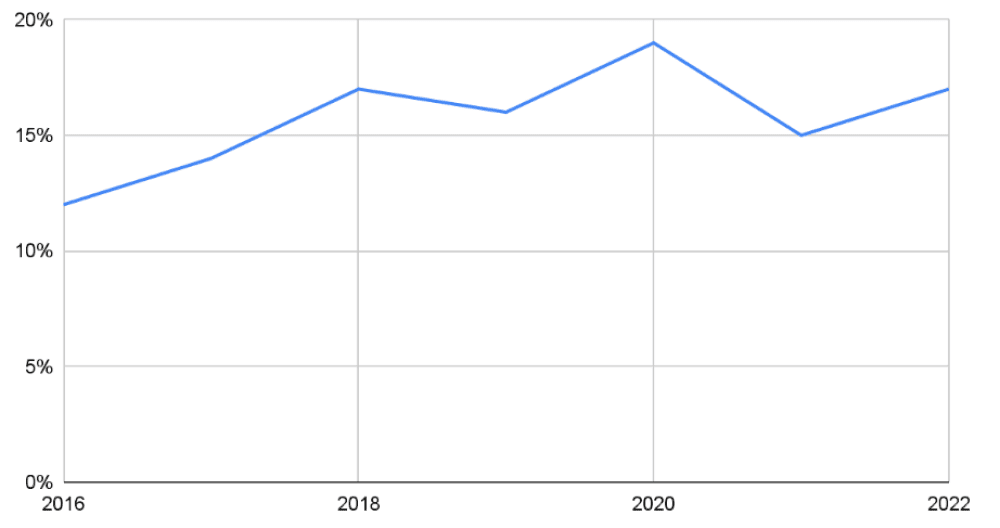
% of students who reported accepting an offer and subsequently declining. Source: AAGE Candidate Surveys 2016-2022
Although harder to quantify, you’ll find that this general attitude appears to carry across to Gen Z’s expectations of the graduate screening process. Consistent feedback from students in Prosple’s user feedback interviews points to Gen Zers being not just worn out by the lengthy screening processes typically required for entry into large graduate programs, but positively offended by it.
A quote from an (anonymised) final year student at the University of Queensland captures the broad sentiment:
I applied for the [large bank - name redacted] graduate program two weeks ago. As soon as I applied, they sent an email and it was like ‘here’s a link to a psychometric test that’s going to take 1 hour 45 minutes of your time. You have to complete this within 48 hours’.
And I was just like, I'm just not doing that.
Maybe it’s petty but the idea that you have these application processes spanning potentially three or four months. There are so many stages. So many of those stages have no human element. I would be investing so much of my time. Where am I getting this kind of respect back?
I'm not saying I need to be coddled every stage of the journey. It's just like, it's so impersonal. And it requires so much from you that like at this point I just can't make myself feel invested in it.
It’s becoming clear that from the perspective of Gen Z, the balance of power has shifted. Gen Zers now expect that an employer should align with their values — and not the other way around.
Key recruiting takeaway
Key recruiting takeaway
With fewer students applying to fewer jobs, compounded by large corporate employers no longer holding the sway they used to (at least as far as Gen Z is concerned), it’s safe to say we’re no longer facing an employer’s market. As a graduate employer, you’ll now have your work cut out for you to attract the talent you could have once taken for granted.
Unfortunately, many recruiters are still living in 2015. Some working for large companies, especially, are wont to proclaim that “We’re [insert prestigious employer] — we have a strong brand, and the best students will come to us.”
Needless to say, when it comes to Gen Z, this attitude will no longer fly. The same goes for expecting Gen Z to put up with an impersonal and onerous screening process.
So what to do?
Thankfully, you don’t need to be recruiting into a small team or startup in order to appeal to Gen Z talent. If your organisation is able to capture the best parts of the small team culture (remember, things like purpose, meaning, community connection, and impact!), you’re well on your way to being an employer of choice.
However, having a great team culture isn’t enough unless it’s also reflected in your marketing. And remember the old screenwriting adage of show, don’t tell. With
Gen Z, you’ll get a lot further using marketing coming from real people (think grad stories, day-in-the-life profiles, user-generated video content, etc) rather than putting out a slick video trumpeting your culture or core values.
Gen Z craves authenticity, remember?
Another key takeaway relates to the screening process for your graduate program. The more personalised and ‘human’ you can make it, the less your risk of alienating Gen Z candidates.
This is obviously easier said than done if you’re processing 10,000 applications. Still, even a quick phone call to establish a personal connection can make all the difference for a high potential Gen Z candidate at risk of disengaging from your screening process.
6. Show me the money
6. Show me the money
Gen-Z doesn’t want to be just another number, but there is a number that really matters: salary! Even in Australia, which dodged the worst of the 2008 global financial crisis, Gen Zers are a generation shaped by economic uncertainty, flat wage growth, and an exploding cost of living.
“They saw parents when they were young and they learned through watching family members and friends that it's tough without money”, explains Sarah Weise.
“We talked about how millennials grew up in a boom time, but Gen Z grew up in a time of hardship and recession. They saw their parents lose jobs and take pay cuts.”
And now, as they approach graduation, Gen Zers are hearing that their degree does not guarantee them a job and they may never own their own home.
It’s no wonder, then, that Gen Z values being financially secure and successful. Far from the common stereotype of the ‘lazy youth’, Gen Zers are hungry for work, side gig savvy, and very money focussed.
“They are, on average, choosing jobs that pay more,” says Weise.
Meanwhile, if you’re used to recruiting millennials, you may still have it in your head that young people care about social impact above all else. However, this also starts to break down with Gen Z.
“You look at millennials and you see all the social impact that they want to do… we just haven't seen that at all in Gen Z,” Weise shares.
Unsurprisingly, we can see these fast-shifting priorities starting to come through in AAGE survey data. In 2019, salary was the sixth most important factor for graduates when considering a job offer; this year it’s second, ranking only behind the work itself.
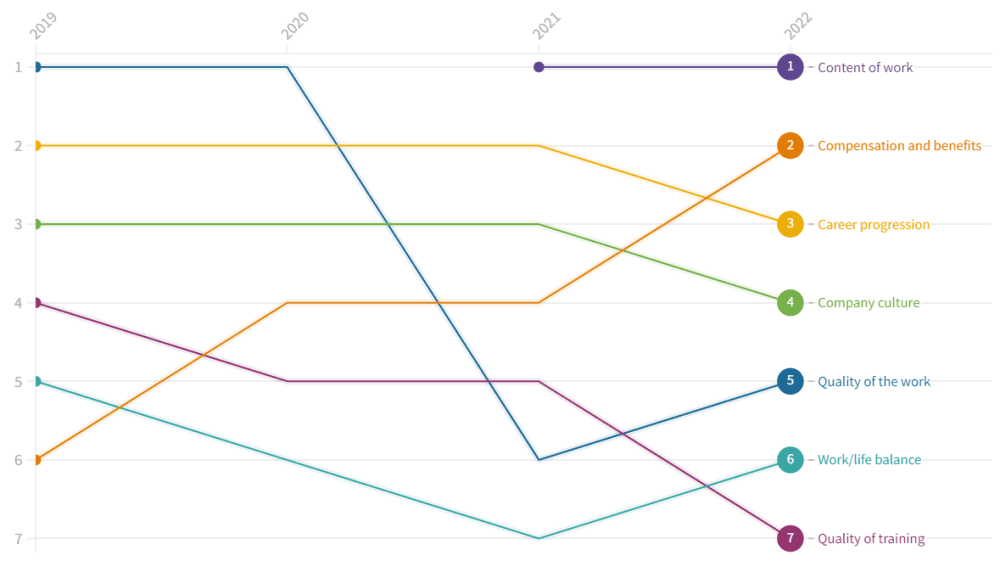
How Australian graduates' priorities have shifted: Most to least important factors when considering job offers. Source: Sydney Morning Herald, May 2022.
Key recruiting takeaway
Key recruiting takeaway
You’re no longer marketing to millennials — period. All that money you used to spend on social impact programs may get you a better ROI with Gen Z talent if it just went towards a small bump in salary.
This isn’t to say that Gen Zers don’t still care about social impact, cultural diversity and equity. They do — but those factors increasingly fall behind salary as decision-making drivers.
In addition to paying as well as you can, you need to be transparent in your job advertising, including when it comes to salary. There’s nothing to be gained from bait and switch — Gen Z recruits will just renege on your offer if the salary isn’t what they expected.
(To get a better sense of what you need to offer in order to compete for top Gen Z talent, download the latest Prosple salary report to see how your graduate salaries compare to industry averages.)
Don’t fight the tide
Don’t fight the tide
By now, you should understand that when recruiting Gen Z graduates, you need to meet them where they are. But the most effective way to do that is not to talk at them, but to work with them in developing your recruiter marketing.
Again, your recent graduate hires are your best assets here. The more you can incorporate them into how you market your employer brand, the better you’ll be able to craft a strong appeal to their peers still at university.
If you’ve got grads with the aptitude and willingness, let them take the lead in creating your recruiting content as much as possible. Encourage them to be honest and transparent about their experiences working for your firm — and then do everything you can do (healthy salaries, a strong, supportive company culture, and a certain degree of flexibility) to make sure that what they have to say will reflect well on your employer brand.
Make your recruiting a year-round effort. Don’t count on talent searching you out, either — get your content out there, every day so that you’ll be the employer brand popping up in TikTok feeds (or the next platform de jour).
Search out talent, take the time to earn their trust, respect their priorities, and you’ll be rewarded.
Make your shift to Gen Z recruiting (mostly) seamless. With Prosple.
Make your shift to Gen Z recruiting (mostly) seamless. With Prosple.
We’re the bridge between employers and top graduate talent. Work with Prosple to:
- Develop a recruiting strategy that speaks directly to Gen Z talent
- Create an appealing user-generated content campaign
- Put your job openings in front of our audience of 4M+
- Give students a clear look into life for fresh grads at your firm
The slide deck and the webinar
The slide deck and the webinar
Visualisations of all data discussed are available in this slide deck that was shared in the webinar:
To watch the webinar in full, click the video below!

